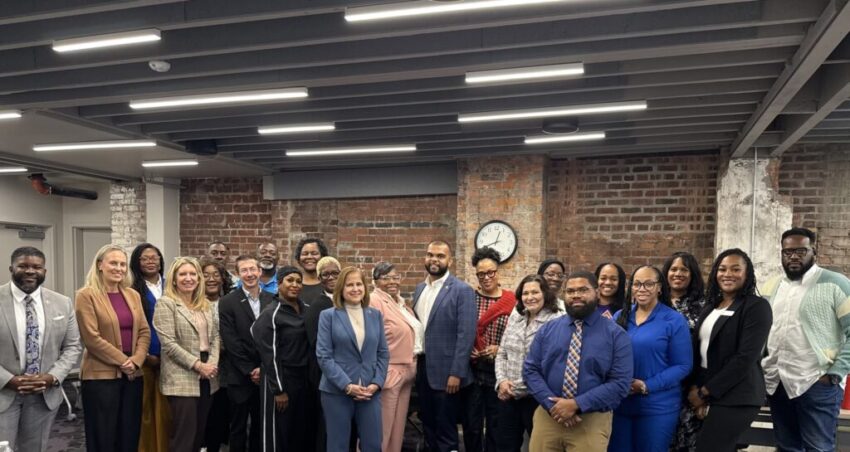
After his Democratic opponent declined all of his debate requests in the Virginia lieutenant governor race, Republican John Reid decided he’d hold a 40-minute one anyway – against a version of her generated by artificial intelligence.
The fake voice of state Sen. Ghazala F. Hashmi (D-Richmond) got to make the first opening statement.
Reid, a conservative talk radio host whose own party once tried to push him out of the race, shot his barbs at a monitor perched on a lectern. His “opponent’s” responses, generated by AI, were delivered in a robotic voice that loosely mimicked Hashmi’s. The AI bot had been trained on Hashmi’s previous public statements on the debate topics, according to the Reid campaign, which also stressed that Reid did not see the questions in advance.
The real-life Hashmi campaign called it a “shoddy gimmick” after Reid streamed the stunt to a few hundred people on his YouTube channel Tuesday night, sparking another debate – on the boundaries of when and how technology should reshape political discourse.
“It’s not any worse than having an AI [President Donald] Trump piloting a plane and dumping on the public,” said Virginia political strategist Bob Holsworth, referring to the president’s controversial social media post over the weekend that portrayed Trump as a crowned fighter pilot dropping what appeared to be feces or sludge onto anti-Trump protesters in U.S. cities.
“This is where we are right now, like it or not,” Holsworth said. “Unless there are norms and rules that emerge in terms of the use of AI, you’re likely to see it used in much more sophisticated ways in 2026. So, welcome to the future.”
The Democratic Party of Virginia issued a statement late Tuesday celebrating seven screenshots of responses given by the synthetic version of the Democratic nominee and “congratulating AI Ghazala Hashmi for winning John Reid’s fake debate.”
The lieutenant governor is a largely ceremonial role in Virginia, aside from occasionally breaking ties in the closely divided state Senate. The post is elected independently from the governor, and this fall’s contest has been sleepy despite the spectacle back in April when Reid’s lawyers sent a cease-and-desist letter to Gov. Glenn Youngkin’s team demanding the Republican governor’s allies stop linking Reid to sexually explicit social media posts, which Reid said aren’t his.
The other two GOP nominees on the Virginia ballot in November – Winsome Earle-Sears for governor and Jason S. Miyares for attorney general – have seldom campaigned alongside Reid.
There have been no forums or formal debates with both candidates in the lieutenant governor’s race – same as during the 2021 campaign for lieutenant governor. The real Hashmi has dominated Reid in fundraising: She has aired two televisions ads to Reid’s zero, and at the end of the most recent campaign finance reporting period in September, she had nearly 10 times more cash.
Yet recent polls have the race as a bit of a toss-up, with Reid and Hashmi virtually tied in a recent Washington Post-Schar School poll that put Hashmi’s 4-percentage-point lead within the margin of error.
Noah Jennings, Reid’s campaign manager, said the campaign tried to simulate a real debate and make it “fair and accurate to her, not campy and overdramatic.”
Jennings said the Reid campaign would have preferred an actual debate to a gimmick: “We have done literally everything we can. We offered any time, any place.”
Hashmi campaign spokesperson Ava Pitruzzello said in a statement that “John Reid’s failed use of deepfakes is a desperate move straight out of Donald Trump’s playbook. While we appreciate that AI Ghazala did share her vision like her commitment to public education and reproductive rights – it’s pretty clear, Reid only cares about shoddy gimmicks and not governing. Maybe he should focus on voters instead of videos. And hasn’t he gotten in enough trouble online already?”
To some Virginia lawmakers, the mere prospect of using technology to supplant real-life campaigning sets off alarm bells.
“This really concerns me for the democratic process and for the campaign cycle. When we just make stuff up, it’s disingenuous, it’s dangerous, it’s irresponsible,” said Del. Michelle Lopes Maldonado (D-Prince William), a former technology lawyer who has worked in Richmond to set up guardrails for AI.
“I think this creates a really artificial – no pun intended – dynamic that I think is not fair to voters,” she said. “There are norms and etiquette that we should be following, and it seems a little absurd that this is a way to move forward.”
Richard Meagher, professor of political science at Randolph-Macon College, said Reid’s stunt certainly raises concerns about what “some unscrupulous” future campaign could do, and “that specter is out there over our campaigns.” But according to Meagher, Reid’s transparency and attribution of the AI statements to Hashmi’s own public views don’t appear to cross any boundary.
“I don’t want to get into pearl clutching. Reid is very clear about what he’s doing here,” Meagher said. “There’s a kind of silliness to it, and any attention to a campaign could be good. … It could portray him as an underdog. It could also portray that this guy’s a joke.”



